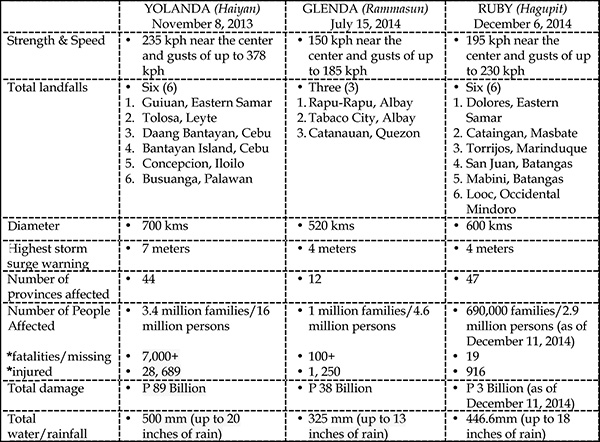Lessons learned
It was a good thing that typhoon “Hagupit” did not live up to its name. Was this due to our collective storming of the heavens with Oratio Imperatas? Or was this because of the extensive preparations undertaken by the national and local government units? Probably both. The fact that the typhoon hit land several times obviously weakened the impact and mitigated its destructive might. In this regard, kudos to our PAGASA weather bureau for accurately predicting the path that the storm would take. Their experience regarding Philippine weather patterns prevailed over the sophisticated technology and equipment of their international counterparts. The heads-up, pro-active strategy of the various governmental units coordinated by the National Disaster Risk Reduction and Management Council (NDRRMC) also helped prevent extensive damage particularly in respect of lost and injured lives. The table below provides a comparative “tale of the tape” (NDRRMC figures) among typhoons Yolanda, Glenda and Ruby:

I believe that the more interesting comparison is between Ruby and Glenda. The latter, which hit the country last July, was weaker, of lesser intensity and impacted fewer provinces. Yet Glenda wrought much greater damage with over 100 lives lost and property damage reaching P38 billion. While with Ruby there are only 19 recorded fatalities and property damage is estimated so far at P3 billion. I believe that the big difference was brought about, particularly in respect of human casualties, by the precautionary measures undertaken. Many lives were lost during Glenda and Yolanda as a result of the storm surges and landslides. So moving people away from coastal and low lying areas and placing them in evacuation centers was a real game changer.
Apparently, the evacuation of over 700,000 people constituted the largest peace time evacuation in Philippine history. The forward positioning of relief supplies also softened the impact on those who were dislocated.
Since our country is natural-disaster prone, it is time that we invested in constructing sturdy and habitable evacuation centers. Instead of using classrooms, gymnasiums and churches which oftentimes do not have sufficient facilities especially relating to hygiene, we should look into building multi-purpose centers that could serve the purpose. Authorities should also inculcate in the citizenry particularly the youth, a greater disaster-preparedness mentality.
In this regard, we can perhaps pick up a lesson or two from Japan. It is supposedly the “most prepared nation in the world.” Similarly situated in the Pacific ring of fire, it has fallen victim to fortuitous events such as typhoons, earthquakes and tsunamis. It has also faced force majeure situations like a nuclear reactor melt down. Aside from a well- trained National Self Defense Force composed of both military and civilian elements including volunteer doctors and para-medics, it conducts frequent emergency drills for the citizenry. Earthquake and tsunami evacuation centers are well-established in every neighborhood. This makes it easy to account for the residents in case of an emergency. One is encouraged not to drive but to just walk to the evacuation center as cars may prevent rescue vehicles from getting in and out of the affected area. Indeed, just like CPR, a course on what to do during an emergency can never hurt.
We have truly learned many lessons from our own natural disasters. But this should not stop us from learning from other countries and copying their best practices as well.
* * *
Greetings: Birth anniversary best wishes to Senator Serge Osmena as well as former Senate President Manny Villar.
Nuptial blessings to Atenean lawyers Ari Singzon and Din-din Lim who will be tying the matrimonial knot this afternoon. The couple will be moving to Hong Kong in January as Ari will be starting work with a major US law firm.
Heavenly greetings to the Rosario sister twins —Belen Rosario King and Natividad Rosario Lim — who would have celebrated their 86th birth anniversary today. Both lived meaningful lives full of compassion, kindness and charity towards their neighbor.
* * *
“Some lessons can’t be taught. They simply have to be learned” – Jodi Picoult
* * *
Email: [email protected]
- Latest
- Trending



























